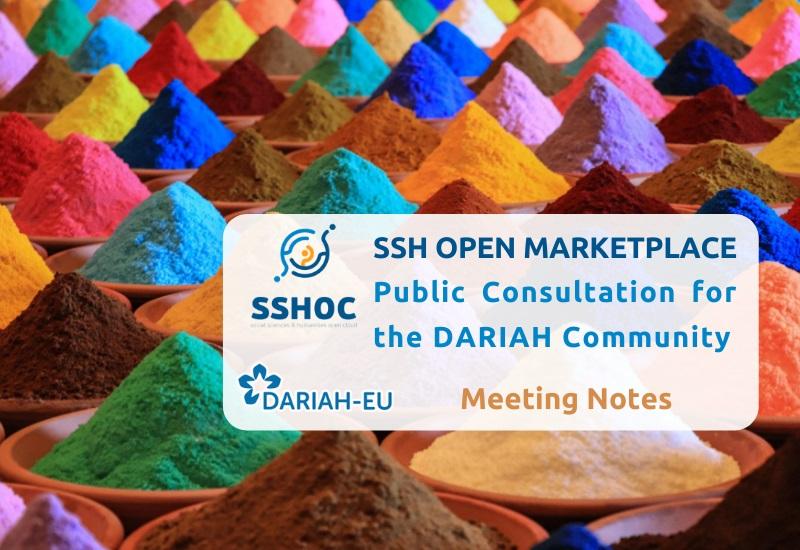
- Social Sciences & Humanities Open Cloud
SSH Open Marketplace: Notes from our Public Consultation with DARIAH

Date:
11 August 2020
The SSH Open Marketplace: Public Consultation for the DARIAH Community, held on July 3rd 2020, aimed to give DARIAHns an early glimpse of the Alpha release of the SSH Open Marketplace developed within the SSHOC project. The goal of the session was to present this discovery portal connected to the EOSC ecosystem, to collectively think about the concept, and to present the different ways the DARIAH community can get involved.
25 representatives of the DARIAH community joined this consultation, members of DARIAH Working Groups, such as the Research Data Management Working Group, the Bibliographical Data Working Group, the Women Writers in History or the Community Engagement Working Groups, partners in DARIAH-affiliated projects and initiatives.
The webinar opened with four short presentations:
- The context of development of the SSH Open Marketplace was presented by Frank Fischer, DARIAH-EU Director. Frank highlighted that the Marketplace is one of the four pillars of the DARIAH Strategic Plan 2019-2026, and explained how the development was conducted in collaboration with other ERICs and partners within the SSHOC project.
- Stefan Buddenbohm, from the University of Göttingen, presented, then, the newly released alpha version of the SSH Open Marketplace. Attendees of the webinar explored the portal through screenshots and a living walkthrough.
- Following this, the content of the SSH Open Marketplace was explained by Klaus Illmayer, ACDH-CH, who elaborated on the data ingestion workflows for sources to populate the SSH Open Marketplace and other technical aspects such as the data model and technical background.
- Finally, Clara Petitfils and Nicolas Larrousse from CNRS/Huma-Num presented the curation and governance strategies developed for the SSH Open Marketplace. They showed how (future) contributors and moderators of the portal could shape the community around the Marketplace, and how significant is the curation of content, especially in terms of future sustainability.
The discussions that followed these presentations and demonstrations were very rich and the DARIAH community gave feedback, shared concerns and made suggestions. A summary of the key points can be found below.
Don’t make it just a catalogue!: Participants underlined that the SSH Open Marketplace shouldn’t be “just another catalogue”. They suggested that future developments should be more focused on the “market” aspect of the portal, positioning thus the Marketplace as a social place where users can exchange practices and methods and where social interactions can be fostered, in forms of community efforts, tagging or curation for example.
Build on existing communities: One of the key messages was that curation is very important. As one of the core aspects to sustain the Marketplace in the long run is to foster the motivation of curators (contributors and moderators), different incentives were discussed as to how to build this community of editors. Participants stressed the importance of relying on existing community-building experiences within DARIAH by involving DARIAH Working Groups members in the curation process for example.
Credits and not competition: Giving credits to contributors and moderators of the SSH Open Marketplace was one of the clearest demands and comments coming from the participants. One way to ensure contributions of different research communities is to demonstrate the added-value of having accurate and carefully curated entries in the SSH Open Marketplace. Furthermore, for research-oriented communities like DARIAH, the possibility to reuse the aggregated and well curated content of the Marketplace could be a potential motivation for contributions. In the long run, if researchers could get academic credit for publishing their workflows in the SSH Open Marketplace, that could be a great step for the DH community.
Interoperability: A topic of concern for participants was the interoperability of the Marketplace with other platforms. The presenters explained the interoperability framework that is guiding the development: for example, wherever it is possible, Linked Open Data IDs – such as Wikidata IDs for tools – are assigned to the Marketplace entries. The API of the SSH Open Marketplace will also be available to allow reuse of the features or the content collected and curated in the portal.
The session ended with a little poll to collect answers of the attendees regarding the ways the SSH Open Marketplace could support their work.

The webinar concluded by describing the SSH Open Marketplace as a “broker” to get to the desired tool, resource or workflow for a research topic, or as an entry point to discover resources not known before and useful to achieve a task.
You can find background information, a recording of the session and the presentation slides here.
This webinar is part of a series planned within the SSHOC project. This first edition, focused on the DARIAH community, will be followed by other sessions addressing different communities’ needs (e.g. CLARIN, CESSDA, E-RIHS, LIBER). Follow the SSHOC project for more.
Get involved! Join the SSH Open Marketplace Tester Community!
